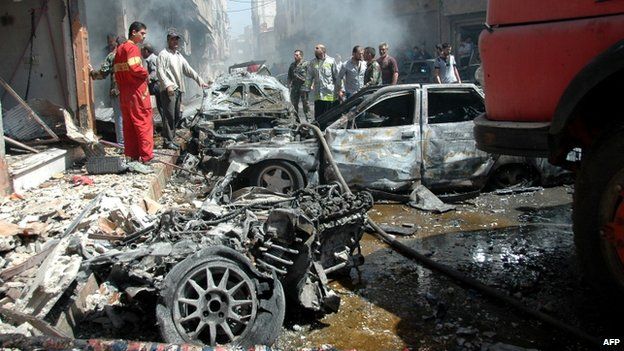Syria conflict: Dozens die in explosions in Homs
- Published

The car bomb injured at least 80 people
At least 37 people have been killed in explosions in the Syrian city of Homs, officials say.
The attacks, which involved at least one car bomb, also injured dozens.
Earlier, at least 14 people were killed and more than 80 wounded in a mortar attack on a technical institute in central Damascus.
The attacks come a day after President Bashar al-Assad registered to stand for re-election, defying calls to step down as a way of ending Syria's civil war.
There are conflicting details about the number of deaths in the government-held, predominantly Alawite district of Zahra, east of the Old City in Homs.
A government official said at least 37 people were killed and 85 hurt. The Syrian Observatory for Human Rights gave the same death toll figures, with 80 injured.
AFP news agency quoted the provincial governor as saying 45 had died in total, including 36 killed by the car bomb and another nine by a rocket that followed, Talal al-Barazi said.
Homs has been a key battleground between government forces and rebels, with large parts of the city in ruins.
Technical institute
The Damascus attack involved four shells which struck the mainly Shia district of Shaghour, police say.
Two hit the Badr al-Din al-Hussein technical institute, where most of the casualties come from.
Government forces have pushed back rebels from many of their strongholds around the capital, but residents say the insurgents have responded by increasing the number of rocket and mortar attacks in city centre.
Large parts of Homs have been reduced to rubble
Syrian rebels frequently use mortars although in Damascus they are militarily meaningless because the rebels are under pressure in the suburbs and are not in a position to mount a serious ground assault
Supporters of President Bashar al-Assad celebrated in Damascus on Sunday as President Assad sought re-election
The government blamed the Damascus attack on "terrorists" - a word it uses to describe all those seeking to depose President Bashar al-Assad.
The attacks came shortly after Human Rights Watch (HRW) accused the Syrian military of indiscriminately using barrel bombs in the northern city of Aleppo.
HRW says that such bombs are inaccurate and cause massive casualties. It says that at least 85 barrel bombs have been dropped on Aleppo alone since a UN Security Council resolution in February demanded an end to the practice.
The Syrian Observatory for Human Rights says that the Badr al-Din al-Hussein technical institute is an Islamic law studies centre, with students as young as 14.
The BBC's Jim Muir in Beirut says that random mortar attacks on Damascus are fairly common, but militarily meaningless, since rebel forces occupying some of the suburbs are not in a position to mount a serious ground assault.
'Chlorine attacks'
Also on Tuesday, the Organisation for the Prohibition of Chemical Weapons (OPCW) said it would launch an investigation into alleged chlorine gas attacks in Syria.
Opposition activists say the government has attacked rebel-held areas with chlorine gas. The government denies the claims, and has promised to provide security for the fact finding mission.
More than 150,000 people are believed to have been killed in the three-year civil war.
Millions of people have fled their homes as fighting shows no sign of easing. The UN says almost 3.5 million civilians are being denied vital aid.
Since March 2011, Syria has descended into civil war as rebel brigades - including Islamists and jihadists linked to al-Qaeda - battle with government forces and among themselves.